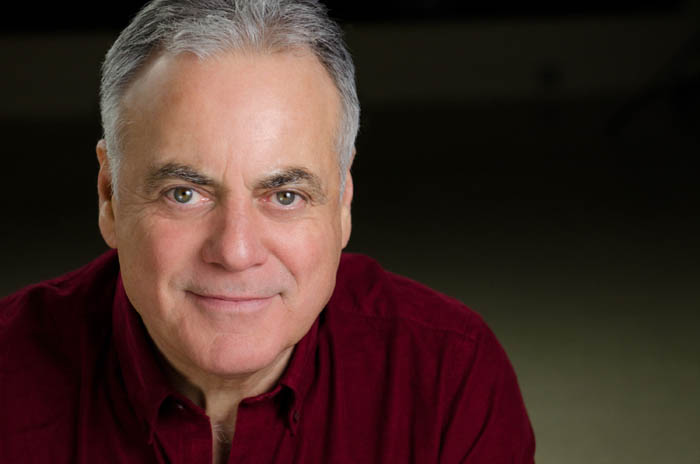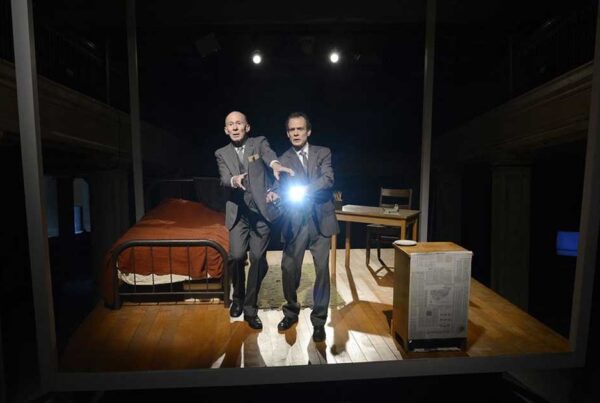
Director John Shepard
It started in LA. Years before he would direct Quantum Theatre’s production of Tamara, John Shepard was visiting the West Coast, and a friend was playing the role of Gabriele d’Annunzio in a Los Angeles staging of the play. Shepard went to support his friend—and was blown away. “In the back of my mind,” says Shepard, “I always thought it would be perfect for Quantum.”
Fast-forward to 2014. Shepard and Quantum Artistic Director Karla Boos have discussed producing Tamara. As it turns out, they both saw the same LA production. Boos gives Shepard the thumbs-up; Tamara is a go. It isn’t until Shepard begins to read the play—a massive 350-page tome—that he wonders if maybe he’s in over his head. “We needed a place [that would be large enough], one character only speaks French, we needed a classic car…” Shepard recalls. “I said to Karla, ‘Are you sure you want to do this?’”
Too late to turn back. Tamara was slated for the 2014-15 season, and would be one of the largest productions Quantum has staged to date. Shepard began his research. “I read a biography of Gabriele d’Annunzio. Once the Rodef Shalom was secured, I sat down with Steffi [Mayer-Staley, scene designer] and went over the floor plan,” Shepard says. Not only did the director have to research the time period and characters, he had to develop an encyclopedic knowledge of the play itself, all 350 pages of the 10 different storylines. “It’s like directing five plays at once.”
Shepard’s copy of the play is a whole United Nations of different colored flags. Each character’s track was broken down and color-coded. Each scene was tracked through a spreadsheet, with character color-codes matching the flags on the script: every scene, every location, every character had to be coded and accounted for.
“We staged each track separately,” Shepard explains. “We’d block every scene for, say, Dante, and block the whole track for every character who shares a scene with Dante. By the time we got through half the characters, most of the other tracks were done.” But to jump into blocking at the get-go, Shepard says all actors had to be off book before rehearsal even began—“which is unheard of.” The director gives immense credit to his actors for that.
Once the tracks were set, the director and cast began to assemble them into the whole, simultaneously occurring play. “It was like putting together a Rubik’s cube,” says Shepard. Even with the floor-plan diagrams, the notes, the color-coded spreadsheets, timing every scene to occur at its exact right time was a challenge. For example, the director says, “I didn’t realize the effect stairs would have on the play. Stairs take time and energy. Actors couldn’t travel as quickly as I thought they could…Plus, we had to remember that each character is being pursued by up to ten people” in the audience.
Some changes have been made from the original script. Certain locations were changed for the sake of logistics. Or for fun, as was the case when Shepard and Boos decided to take advantage of the Rodef Shalom’s beautiful outdoor garden and begin the play there, instead of the atrium as John Krizanc had written. Another scene was written to take place in the kitchen—but the local chefs catering the evening’s meal will be occupying that space to prepare the food.
Shepard, a faculty member at Point Park University, has acted in a number of Quantum productions, including Betrayal, Speaking in Tongues, and Electric Baby, to name a few. He’s directed several plays, small scale and large, but nothing else as immersive and grand as Tamara. “What I like about Tamara is it was sort of the groundbreaker. Written in the ‘70s, produced in the early ‘80s—it’s kind of the granddaddy of immersive theatre.”
Four weeks in, it appears Shepard’s work—and the work of his talented cast and crew—has paid off. Beaming with pride, Shepard admits: “A compliment I heard opening night was from someone who saw the New York production—they said ours was better.”




